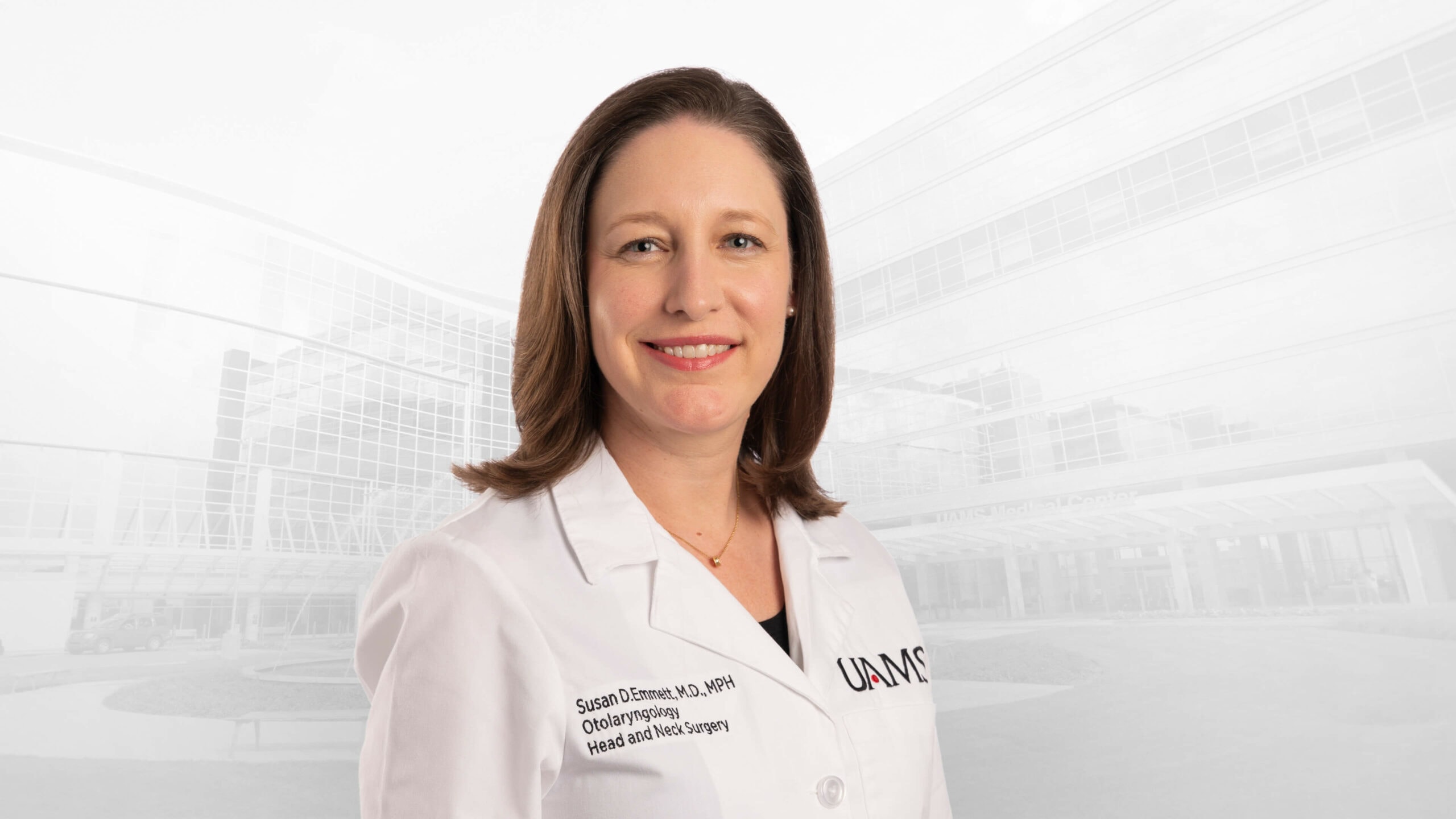View Larger Image

Susan Emmett, M.D., MPH
Image by Evan Lewis
Otolaryngologist Susan D. Emmett, M.D., MPH, to Direct New UAMS Center for Hearing Health Equity
| LITTLE ROCK — Susan D. Emmett, M.D., MPH, an otolaryngologist and public health-trained researcher who holds four grants from the National Institutes of Health, has joined the University of Arkansas for Medical Sciences (UAMS), where she will lead the new Center for Hearing Health Equity.
Emmett is an associate professor in the UAMS College of Medicine Department of Otolaryngology-Head and Neck Surgery, where the center is being established, and has a secondary appointment in the Fay W. Boozman College of Public Health.
“Dr. Emmett is a star in our field, with a national and international reputation,” said John Dornhoffer, M.D., chair of the department. “As one of the most successful NIH-funded ENT surgeons in the country, she will help UAMS quickly become a leader in research involving hearing health disparities both in Arkansas and abroad. I am extremely excited to have been able to recruit a physician scientist of her caliber.”
“The College of Public Health is extremely pleased that Dr. Emmett will be joining the Department of Epidemiology,” said Dean Mark L. Williams, Ph.D. “Hearing loss is an understudied aspect of obesity, diabetes and high blood pressure. Dr. Emmett’s research will help us understand and ultimately prevent and treat hearing loss.”
While part of Emmett’s time is spent seeing patients and performing cochlear implant surgery, her primary focus is on research into hearing loss disparities, in an effort to improve access to care for people, particularly children, in underserved areas. The research aims to identify those who are at risk of developing hearing loss or are already experiencing it but haven’t been diagnosed, and help them easily access affordable preventive care and treatment.
Worldwide, 1.5 billion people are believed to have some degree of hearing loss, and 60% of hearing loss in children is preventable according to the World Health Organization.
“Childhood hearing loss has a lifelong impact,” she said, citing effects on speech and language development, the ability to learn in school, and later obtain a job. “But it could be prevented if we identify the problem early and make sure children have access to the care that they need. To tackle this problem takes thinking about this from several different perspectives.”
That’s where the Center for Hearing Health Equity comes in. The center is the only center of its kind in the world and will be home to research conducted by two multi-center networks, both run by Emmett. The Global HEAR (Global Hearing Loss Evaluation, Advocacy & Research) Collaborative is an international research network that includes a multidisciplinary group of investigators from 28 countries, and HEAR USA has six sites as the United States HEAR Collaborative branch. Both collaboratives are dedicated to reducing disparities in hearing loss across the country and worldwide.
Emmett is moving her four NIH grants to UAMS from the Duke University School of Medicine, where she earned her medical degree in 2010 and was most recently an associate professor of surgery and global health. Three of these grants are HEAR Collaborative endeavors, including two randomized trials that together involve more than 20,000 children in about 100 schools in Appalachia in Kentucky and in rural Alaska.
In the third HEAR Collaborative grant, Emmett is partnering with industry and academic partners in South Africa company to develop an inexpensive, portable tool to check for middle ear infections that are often a precursor to hearing loss. This cell phone-based screening device can be used by teachers or community health workers to screen children in schools instead of relying on audiologists with advanced degrees — a scarce resource in rural and underserved areas.
“There is no standardized method across the country to screen children for hearing loss,” she said, and even once rural children with hearing loss are identified, they often never receive the care that they need. “Our plan is to change that, and completely alter the paradigm for detecting hearing loss early and ensuring access to treatment. My goal is to eventually eliminate preventable childhood hearing loss through early detection and effective intervention.”
UAMS is the state’s only health sciences university, with colleges of Medicine, Nursing, Pharmacy, Health Professions and Public Health; a graduate school; a hospital; a main campus in Little Rock; a Northwest Arkansas regional campus in Fayetteville; a statewide network of regional campuses; and eight institutes: the Winthrop P. Rockefeller Cancer Institute, Jackson T. Stephens Spine & Neurosciences Institute, Harvey & Bernice Jones Eye Institute, Psychiatric Research Institute, Donald W. Reynolds Institute on Aging, Translational Research Institute, Institute for Digital Health & Innovation and the Institute for Community Health Innovation. UAMS includes UAMS Health, a statewide health system that encompasses all of UAMS’ clinical enterprise. UAMS is the only adult Level 1 trauma center in the state. UAMS has 3,275 students, 890 medical residents and fellows, and five dental residents. It is the state’s largest public employer with more than 12,000 employees, including 1,200 physicians who provide care to patients at UAMS, its regional campuses, Arkansas Children’s, the VA Medical Center and Baptist Health. Visit www.uams.edu or uamshealth.com. Find us on Facebook, X (formerly Twitter), YouTube or Instagram.
###